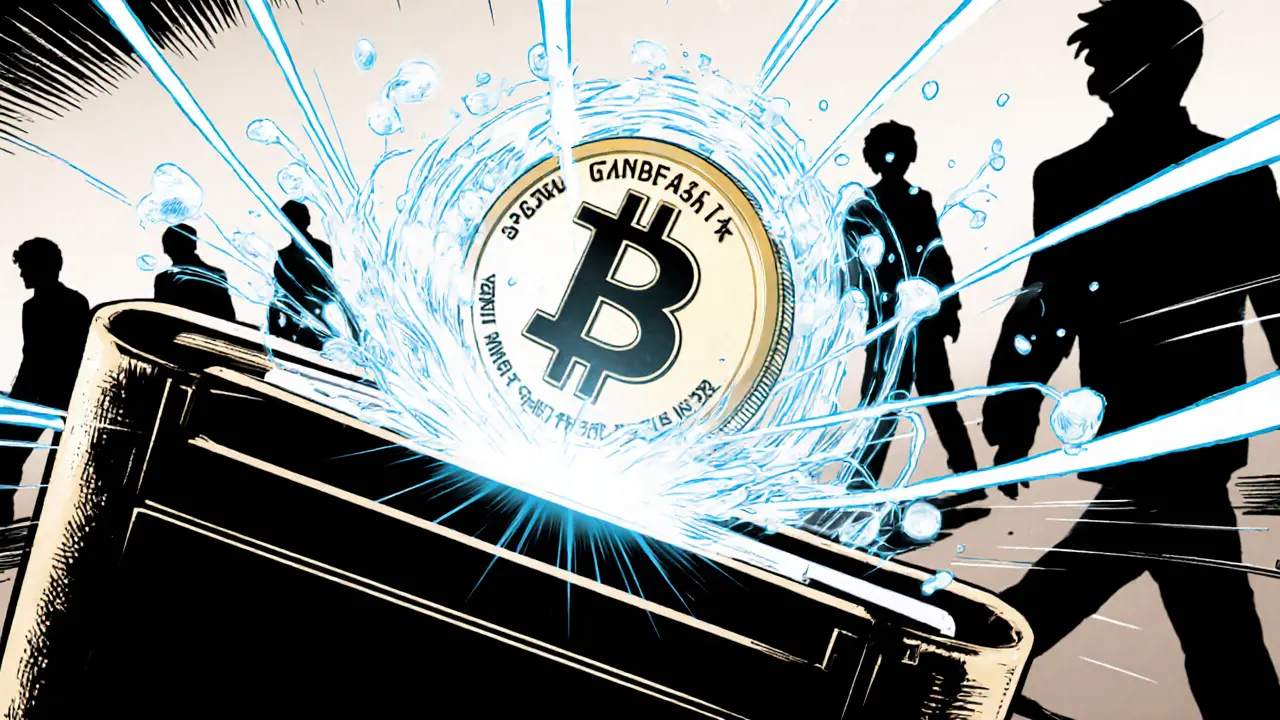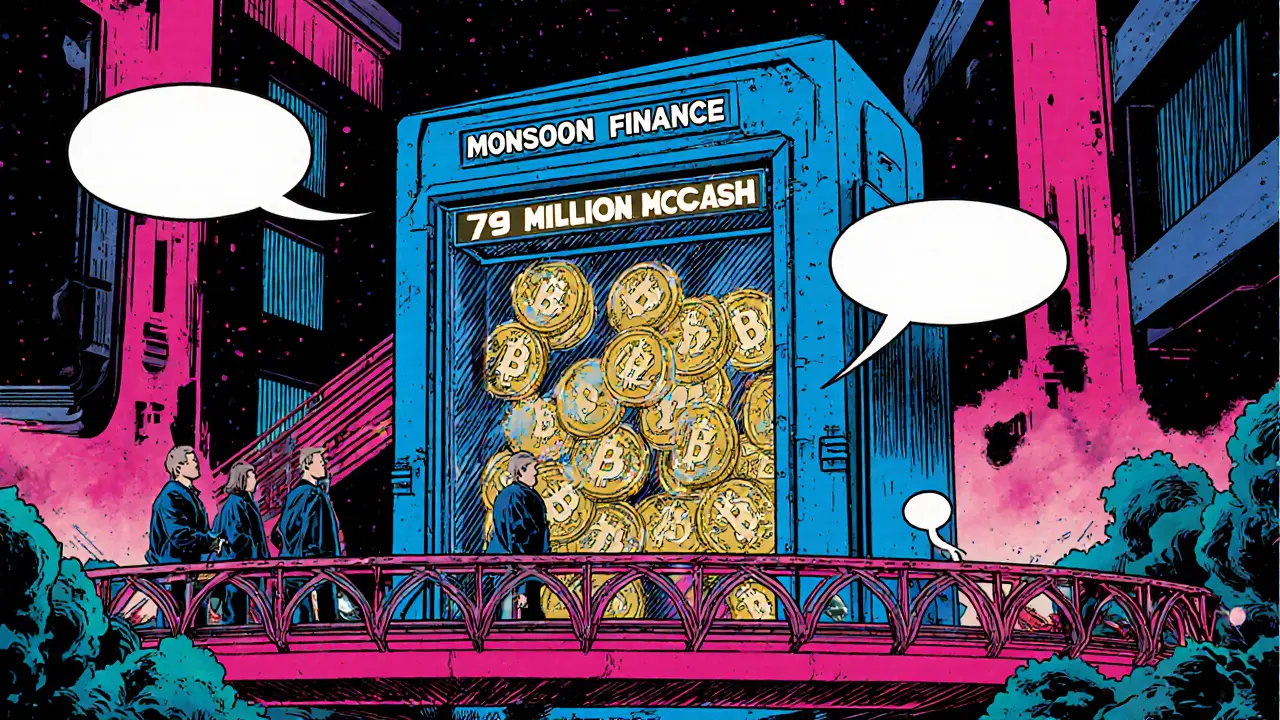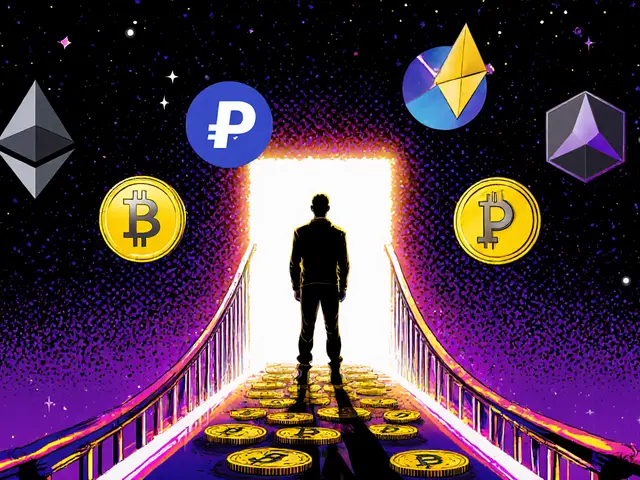MCASH Anonymity Mining Earnings Calculator
Calculate your potential MCASH earnings by using the Monsoon Finance privacy bridge. MCASH is earned through privacy transactions, not through airdrops. The more you use the bridge, the more tokens you earn.
Note: MCASH price is approximately $0.000295 USD as of November 2025. Earnings are based on current protocol rules where users earn 5-20 MCASH per transaction depending on volume.
Enter your details above to see your estimated earnings.
There was no MCASH airdrop. Not in the way you think. No free tokens dropped into your wallet just for signing up. No viral Twitter campaign. No Discord giveaway. If you're looking for a quick free MCASH token grab, you won't find it. Monsoon Finance didn't do that. And understanding why it didn't - and how it actually distributed tokens - is the only way to make sense of this project.
Monsoon Finance Was Never About Free Tokens
Monsoon Finance launched in September 2021 with a clear goal: make transactions private across multiple blockchains. Not just Bitcoin or Monero-style privacy. Real, cross-chain privacy. You could deposit ETH on Ethereum and withdraw it privately on BSC or Polygon. That’s technically hard. And it’s expensive to build. So they didn’t hand out tokens like candy. They raised money - $2.29 million across six rounds - and used it to build a protocol that works.
Their token, MCASH, was never meant to be a speculation tool. It was built to be a governance token. The only way to earn it was to use the platform. That’s called anonymity mining. Not airdrop. Not faucet. Not referral bonus. You earn MCASH by making private transactions. The more you use the privacy bridge, the more tokens you get. It’s like mining Bitcoin, but instead of solving math problems, you’re protecting your financial privacy.
How MCASH Was Actually Distributed
The total supply of MCASH is 100 million tokens. But only 2.1 million were ever in circulation at launch. That’s not a mistake. That’s by design. Here’s how the rest was allocated:
- 6.97 million tokens (6.97%) went to private and pre-sale investors - these were early backers who put money in before the public could even access it.
- 875,000 tokens (0.88%) were sold in public sales.
- 17.65 million tokens total were sold across all fundraising rounds, raising the $2.29 million.
- The rest - over 79 million tokens - are locked in long-term vesting schedules, reserved for protocol development, team incentives, and future ecosystem growth.
There were no random airdrops to early adopters or community members. No “first 10,000 sign-ups get 100 MCASH” nonsense. Instead, tokens were released slowly over time. The initial TGE (Token Generation Event) on September 30, 2021, released 50% of the allocated tokens immediately. The next 25% came 30 days later. Then another 25% after another 30 days. Other platforms like BullPerks had their own schedules - 8% upfront, then 10% every 30 days for 270 days.
That’s not airdrop. That’s controlled distribution. It’s meant to prevent dump pressure. It’s meant to give the protocol time to grow before the market gets flooded.
What Anonymity Mining Actually Means
If you want MCASH today, here’s how you get it: use the Monsoon Finance privacy bridge.
You pick a supported chain - say, Ethereum. You deposit your ETH or USDC. You choose a destination chain - say, Polygon. You initiate a private transfer. The protocol uses zk-SNARKs - zero-knowledge proofs - to hide the amount, sender, and receiver. When the transaction completes, you earn MCASH as a reward. The more you use it, the more you earn.
This isn’t theoretical. The protocol’s trusted setup ceremony had 1,114 individual contributions. That means 1,114 people helped create the cryptographic foundation. If even one of those contributors stayed honest, the system is secure. That’s how serious they were about privacy.
There’s no “claim your airdrop” button. No form to fill out. You don’t need to follow them on Twitter. You don’t need to join Telegram. You just need to use the bridge. And you need to understand that this isn’t a get-rich-quick scheme. It’s a long-term privacy tool.

Why MCASH Price Plunged After Launch
At launch, MCASH traded around $0.20. The seed round investors paid $0.08. The private round paid $0.153. For a while, it looked promising. ROI hit over 4x for early backers.
Now? The price is around $0.000295. That’s a 99.8% drop from its peak.
Why? Three reasons:
- Low liquidity. Trading volume on Binance and other exchanges often hits zero for days. No buyers. No sellers. That kills price.
- No mass adoption. Privacy is hard. Most users don’t care. They want to trade, not hide. Monsoon Finance built a tool for a niche. The niche didn’t grow fast enough.
- Market conditions. Crypto winter hit hard in 2022. Privacy coins got crushed. Monero dropped 70%. Zcash dropped 80%. MCASH was just another casualty.
Current market data shows MCASH ranked #9309 by market cap. That’s near the bottom. It’s not dead - but it’s not thriving either.
Is MCASH Still Active?
Yes. The protocol is still running. The privacy bridge works across Solana, Moonbeam, BSC, Polygon, and Fantom. The governance system is live. MCASH holders can still vote on upgrades, fee changes, and new chain integrations.
But here’s the catch: only a few thousand people hold MCASH. And even fewer use the bridge regularly. Without usage, there are no anonymity mining rewards. Without rewards, there’s no incentive to hold. It’s a feedback loop that’s stuck.
Monsoon Finance didn’t fail technically. Their zk-SNARK implementation is sound. Their multi-chain bridge is unique. But they didn’t solve the adoption problem. Privacy tools need users. And users need reasons to switch.

What You Can Do Today
If you still want MCASH, here’s your path:
- Go to monsoon.finance (verify the URL - scam sites exist).
- Connect your wallet (MetaMask, Phantom, etc.).
- Choose a chain to deposit from - Ethereum, BSC, or Polygon.
- Choose a chain to receive on - any of the supported networks.
- Deposit your asset. Initiate the private transfer.
- Wait for confirmation. Earn MCASH.
Don’t expect to get rich. You might earn 5-20 MCASH per transaction, depending on volume and protocol rules. At $0.000295, that’s less than $0.01. But if you use it consistently over months, you might accumulate enough to vote in governance.
Alternatively, buy MCASH on decentralized exchanges like Uniswap or PancakeSwap. But be warned: slippage is high. Liquidity is thin. You might pay 5-10% more than the listed price just to get in.
Is Monsoon Finance Worth Your Time?
Only if you believe in cross-chain privacy as a long-term need.
Regulators are cracking down on crypto. Exchanges are KYC-ing everything. Chain analysis firms like Chainalysis track every move. If you care about financial privacy - not just speculation - then Monsoon Finance is one of the few projects still building it.
But if you’re looking for a quick flip? Walk away. The token’s value is tied to usage, not hype. And usage is low.
Think of it like this: Monsoon Finance built a private mailbox that works across all major postal systems. But almost no one uses it. The mailbox still works. It’s secure. It’s innovative. But unless people start sending letters through it, it’s just a fancy box sitting in a warehouse.
Future Outlook
Monsoon Finance’s future depends on one thing: adoption.
If they can partner with DeFi protocols to offer private swaps - like a private version of Uniswap - that could drive usage. If they integrate with wallet apps like Trust Wallet or Phantom as a default privacy option, that could help. If they launch a mobile app that makes anonymity mining as easy as sending a text, that could change everything.
Right now, none of that has happened. The team hasn’t gone silent - but they haven’t pushed hard either. No big marketing campaigns. No influencer partnerships. No new chain integrations since 2022.
It’s a quiet project. A technical one. And that’s its strength - and its weakness.
Was there ever a public MCASH airdrop?
No. Monsoon Finance never ran a traditional airdrop. Tokens were distributed through private and public sales, and later through usage-based rewards called anonymity mining. There was no free token distribution to wallet holders or social media followers.
How do I earn MCASH tokens today?
You earn MCASH by using the Monsoon Finance privacy bridge. Deposit an asset on one blockchain (like Ethereum), then privately transfer it to another (like Polygon). Each successful transaction earns you MCASH as a reward. The more you use it, the more you earn.
Is MCASH still tradable?
Yes, but with extreme caution. MCASH trades on decentralized exchanges like Uniswap and PancakeSwap, but liquidity is very low. Trading volumes often drop to zero for days. Prices are volatile and slippage can be over 10%. Only trade small amounts.
What’s the current price of MCASH?
As of November 2025, MCASH trades around $0.000295 USD. This is down over 99% from its all-time high of $0.20 in late 2021. Market cap is under $1 million, and it ranks near the bottom of cryptocurrency listings.
Can I use MCASH for governance voting?
Yes. MCASH is a governance token. Holders can vote on protocol upgrades, fee structures, and new chain integrations. But voting power is proportional to token holdings. With only a few thousand holders and low circulating supply, most votes come from a small group of early participants.
Is Monsoon Finance safe to use?
The protocol’s cryptography is secure. It uses zk-SNARKs with 1,114 trusted setup contributions - meaning it’s cryptographically safe as long as at least one contributor didn’t cheat. However, like all DeFi protocols, there’s smart contract risk. Always use small amounts, double-check the official website, and never share your private key.


Nathan Ross
November 19, 2025 AT 01:43It's not dead. It's just waiting for the next crypto winter to make people realize they need it.
garrett goggin
November 19, 2025 AT 20:39Bill Henry
November 21, 2025 AT 16:03Jess Zafarris
November 23, 2025 AT 15:46jesani amit
November 24, 2025 AT 06:12Peter Rossiter
November 25, 2025 AT 08:48Mike Gransky
November 26, 2025 AT 16:07Ella Davies
November 27, 2025 AT 04:20Henry Lu
November 27, 2025 AT 15:16nikhil .m445
November 28, 2025 AT 13:26Rick Mendoza
November 29, 2025 AT 04:19Lori Holton
November 30, 2025 AT 04:55Bruce Murray
November 30, 2025 AT 15:21Barbara Kiss
December 2, 2025 AT 10:12Aryan Juned
December 2, 2025 AT 13:11Nataly Soares da Mota
December 3, 2025 AT 15:58Teresa Duffy
December 5, 2025 AT 02:49Sean Pollock
December 6, 2025 AT 04:58Carol Wyss
December 6, 2025 AT 17:00Nathan Ross
December 8, 2025 AT 11:23